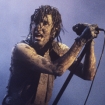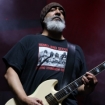"I'm very greedy," Chris Cornell admits. "I want to make exactly the kind of record I want to make, and I want it to sell millions of copies and be a worldwide success." Cornell laughs, acknowledging the outsized dimensions of his desire. "Why not?"What's funny is that in a career now entering its third decade, he's actually managed to realize that goal: Perhaps no one else in mainstream rock today more skillfully negotiates the creative-commercial divide than Cornell, the guy who helped turn grunge into an international phenomenon as Soundgarden's singer, then proved that the supergroup wasn't dead as frontman of Audioslave. "I've heard my entire career the notion that to achieve commercial success, you have to somehow bend yourself toward it," he says. "But it's simply not true." Here, Cornell walks us through the albums that convinced him he's right.
Soundgarden — Ultramega OK (SST, 1988)
Soundgarden's debut full-length following a pair of EPs for Seattle's Sub Pop, the Grammy-nominated Ultramega OK captured Cornell and his bandmates (then including bassist Hiro Yamamato) at a moment when rocking was more important than thinking: Sludgy, fuzz-ravaged tunes like "All Your Lies" were ur-grunge texts smeared with post-psychedelic residue.
"Production-wise, it didn't really sound like us. Drew Canulette produced based on the fact that SST had used his mobile unit for a live Black Flag record. We figured, 'Okay, he was involved in making this live Black Flag record, so he can't be a complete idiot about recording.' But in my opinion he was a complete idiot about recording. We had done demos for Ultramega in Seattle with Jack Endino that sounded much better. And that's the only time where I was really devastated by the fact that we kind of missed it."
Soundgarden — Louder Than Love (A&M, 1990)
Louder Than Love signaled Soundgarden's entry into artier waters; the music was unapologetically heavy, but it also reflected the group's interest in post-punk, as well as a finely honed sense of sarcasm. The band's first major-label disc, it also brought countless record-industry ears to Seattle.
"Starting with Jane's Addiction and the Red Hot Chili Peppers, there was an understanding that rock music was gonna change. The landscape of major-label rock looked a lot like it does now, where there's a huge insurgence of bands that are totally vital but totally under the radar. And Louder Than Love kind of broke open rock radio a little bit, created the beginnings of what made the meteoric rise of Nevermind possible. Stations around the U.S. played 'Get on the Snake,' a song that's very aggressive and doesn't even really have a chorus. So we went from the top of the indie heap to being thrown into the heavy-metal thing. And the word embarrassing came up a lot. Suddenly we had to deal with this existential dilemma: I'm looking at a picture of my band in this magazine, but when I turn the page it's Poison. What does that mean?"
Temple of the Dog — Temple of the Dog (A&M, 1990)
A one-off project memorializing Andrew Wood, the late singer of Seattle's Mother Love Bone, Temple of the Dog paired Cornell and Soundgarden drummer Matt Cameron with the surviving members of MLB, including bassist Jeff Ament and guitarist Stone Gossard, as well as an unknown buddy of theirs named Eddie Vedder. "Hunger Strike," a haunting Cornell-Vedder duet, became a huge MTV hit once Pearl Jam broke.
"It didn't make any sense to the record company. But it was divine timing, because the other guys hadn't become Pearl Jam yet. They didn't really have a record deal, so they didn't have anyone to tell them they couldn't do it. The project just started out as, 'Hey, maybe it'd be fun to go into the studio with members of Mother Love Bone and record some songs and put out a single.' Then I kind of talked myself out of releasing it. I'd made a tape of what we'd done, though, and the rest of the guys got a hold of it. Jeff called and said, 'I heard these songs, and I really love them. We should do it.'"
Soundgarden — Badmotorfinger (A&M, 1991)
Badmotorfinger marked bassist Ben Shepherd's first album with Soundgarden. The band's tough, smart fusion of metal riffs and punk rage never sounded more natural.
"If you took the kimonos and the hip-shaking and the light show from Led Zeppelin, instead of the rhythm section and the songs, you fucked up. I mean, Jimmy Page used to wear argyle vests and play guitar with a bow and was into Satanism—that's way fucking cooler than his dragon bellbottoms. That's pretty simple, but nobody got it. So to the rock world, Badmotorfinger was the first real classic of thinking-man's metal. To us, it was the last of that kind of record — it defined what we'd been trying to do as a band the whole time. We had to move on."
Soundgarden — Superunknown (A&M, 1994)
Cornell calls Superunknown, Soundgarden's most commercially successful album (thanks to the modern-rock smash "Black Hole Sun"), a product of the band's "White Album period," in which the members were writing more on their own and experimenting with new sounds and ideas.
"'Black Hole Sun' was a hit song in a way that we had never experienced and wouldn't experience again as Soundgarden. The record company couldn't get it off the radio when they were trying to follow it with the next single. We were worried because we were hitting fans that didn't know anything about our very long history, with a song that didn't really represent us entirely. None of us ever imagined that it would be a single. I personally don't even know what the lyrics mean, but for some reason they resonated with people."
Soundgarden — Down on the Upside (A&M, 1996)
Though it didn't sell the way Superunknown did, Soundgarden's swan song afforded Cornell and his bandmates the opportunity to continue defining what sort of music the band would play.
"No producer, no mixer, nothing. I think it's the crowning achievement of Soundgarden's life cycle. It's my favorite of our records. I wasn't really aware of this at the time, since we produced it — which meant that I had no objectivity — but it was the record where the whole band was involved and the whole band was there for everything. It's not like we were falling apart and couldn't sit in a room. In fact, it was the opposite: We faced our biggest challenge together, which was following up a monster."
Chris Cornell — Euphoria Morning (Interscope, 1999)
Exhausted from the effort of rocking hockey arenas, Cornell scaled back for his introspective solo debut, hooking up with members of an L.A. band called Eleven that once featured ex–Pearl Jam drummer Jack Irons.
"For sure, the most intimidated I ever was making a record. My first thought was, This is great, I can do absolutely anything I want. This is gonna be really easy. And then the second thought was, What's that gonna be? When you have so many options, it becomes kind of daunting. And I think the record kind of sounds like that."
Audioslave — Audioslave (Epic, 2002)
Cornell's current band formed when guitarist Tom Morello, bassist Tim Commerford, and drummer Brad Wilk — all avowed Soundgarden fans — decided they wanted to play with Cornell following the departure of frontman Zack de la Rocha from Rage Against the Machine. The four first called themselves Civilian, then settled on Audioslave.
"Our experience was very much like the original days of Soundgarden, where we got together in a room and started writing songs and weren't really in control of where it went. And it was very surprising where the music went, even to people like [producer] Rick Rubin, who had a very clear idea of what he thought it would be. I think Tom and Brad and Timmy took a much bigger risk in their career than I did. I'd already tested my audience with Temple of the Dog and my solo record and different things from soundtracks. But these guys created a genre in Rage and then made records very specific to that genre. The first Audioslave record had to boldly break out of that."
Audioslave — Out of Exile (Interscope, 2005)
Proof that Audioslave wasn't the one-off project many observers had taken it for, Out of Exile saw the relationship between Cornell and his new bandmates deepen and intensify.
"At first, people thought that maybe I had come in and auditioned to replace Zack in Rage Against the Machine, which of course was not the case at all. I knew from experience — and the beauty of Audioslave is that we all had a lot of experience before we even started the band — that the first couple of records were gonna tell the whole tale, so there was no point in opening my mouth about it. Who cares?"
If you are experiencing suicidal thoughts, contact the National Suicide Prevention Lifeline at 988 or go to SpeakingOfSuicide.com/resources for a list of resources.








